Pillar Rock
The Cumbrian who,with his brother, gave his name to the Westmorland Cairn on Great Gable—from which point of vantage they considered the finest view in all Lakeland could be obtained—died just 50 years ago. And now, with fitting timing, a cragsman's climb on Dove Crag, Patterdale, one of the steepest cliffs in England, has just been renamed Westmorland's Route in honour of his son—Lieut Colonel Horace Westmorland of Threlkeld.
Surely one of the sprightliest septuagenarians in Lakeland- or anywhere else- today. Although Colonel Westmorland —" Rusty" to a host of climbers and skiers all over Britain and in many places abroad—has been climbing steep rocks for 60 years he is still able to tackle some of the harder routes and, only a short time ago, led his party of youngsters up a " very severe " in his beloved Borrowdale.
He would climb every day if he could find the companions; as it is, he has to content himself with three or four days a week in summer, and perhaps only a paltry two or three in winter. Only the mountains count; one can easily imagine him sulking in cities. At 73 years of age, Rusty Westmorland is not only an extremely good rock climber and competent skier, but also manages, with or without conscious effort, to look the part. To many people, unfamiliar with the mountain scene, he must represent exactly their idea of the bold cragsman, bursting with health and determination.
The clipped moustache, the erect bearing, the polished boots, and the neat, efficient clothes reflect his military background, while the tanned face, the clear, twinkling eyes, the jaunty Austrian hat, and the springy step suggest the mountaineer. The Mountain Rescue flash on his shoulder—he it was who revived the Keswick Mountain Rescue Team several years ago—is worn for use, not for ornament, and his general neat, well groomed appearance on a climb is in striking contrast to that of the many dirty, bearded youths, clanking with ironmongery, who often decorate the crags today.
The yeomen forbears of Horace Westmorland farmed at Milburn under the shadow of Crossfell—they had taken their name from their native county—but Rusty himself was born at Penrith, just over the Cumberland border, where his father had a leather business. Right from his birth the mountains were in his blood. His father, Tom Westmorland, his uncle Ned and his aunts were scrambling and camping in the Lakeland fells last century long before the joys of steep, remote places had become as commonplace as they are today. One of his aunts—Mary (May) Westmorland — was the second woman to reach the summit of Pillar Rock, on July 24th, 1873, The first having been a Miss A Barker who had achieved the feat just three years earlier. May went up, un-roped, with her brothers Tom and Edward and on the summit, where they found a bottle containing the names of the 10 previous conquerors, they stood to attention and proudly sang God Save the Queen.
Later Tom celebrated the occasion with a poem, A Summer Ramble, which describes the day in detail. A photograph taken at the time shows May to have been a short, sturdy, good looking girl and her brothers to have been most determined looking men, sprouting youthful beards. May wore a smart, close fitting jacket, a short skirt and trousers rather like plus fours, with collar and bow tie and a peculiar hat. Not unlike a sailor's. Her brothers wore the outdoor clothes of the period and heavy shepherds' boots, and all three carried poles at least six feet long. Another memorable day for the Westmorland brothers was when they skated the full length of Ullswater from Pooley Bridge to Patterdale and back to Watermillock, but the day they put their name on the map was a summer afternoon in 1876 when they built the Westmorland Cairn on Great Gable.

Dove Crag
They were not bad judges, too, for the sight of the patchwork fields of Wasdale Head nearly 3,000 feet below, the ring of the highest mountains in Lakeland all around, with Wastwater flanked by the frowning Screes, and the sea in the distance, is always a memorable picture. To-day the precipice below the cairn also bears the name of Westmorland Crags, and a rock climbing route up the centre is called Westmorland Ridge. This was young Horaces' legacy and he made full use of it. At eight years of age he went up Crossfell, the great, sprawling Pennines peak above the home of his ancestors and later the same year we find him scrambling along Striding Edge.
Each summer after that he and his father and their family and friends scrambled, camped, rowed, sailed and walked the fells, and when he was 11 years of age the boy first saw and met real climbers—with ropes. They were a formidable party: Haskett-Smith, the first man to climb Napes Needle; John Wilson Robinson, the Cumbrian whose memorial is the cairn on the High Level Route to Pillar; and Geoffrey Hastings and Ellis Carr, two very prominent mountaineers. They had just been " looking at the big gully of Tarn Crag on Dollywaggon Pike without success, but the following year, fired with a new enthusiasm for verticality, the young Horace,again with his father, managed to get about 20 feet up the great unclimbed pitch.
The climb remained a challenge to the boy and 12 years later, as a young man of 24, he succeeded in leading his two cousins in the first ascent of the whole route. And a few days later Horace Westmorland led the same party up the upper part of the route on Dove Crag which has now been renamed Westmorland's Route in acknowledgment of Rusty's contributions to climbing in this, as well as in other, areas. As a boy of 15 young Horace had been taken—again by his father—to the summit of Pillar Rock by way of the easy Slab and Notch route, and exactly 50 years later, in 1951, Col Westmorland achieved his great ambition by making a jubilee ascent of the Rock.
The route chosen on this occasion was the considerably harder North Climb which Rusty, then 65 years of age, led throughout without any difficulty. The event being fittingly celebrated on the summit with a bottle of wine. Since that day, eight years ago, the old warrior, who looks no more than a cheery 60, seems to have been climbing increasingly harder things, to the frequent embarrassment and shame of companions only half his age. And yet, 15 years ago, this same man, after 31 years service in the Canadian Army and half a lifetime of surveying, climbing and skiing in the Rockies and other exciting places, had been invalided home to England, and told to take things easy in his retirement.
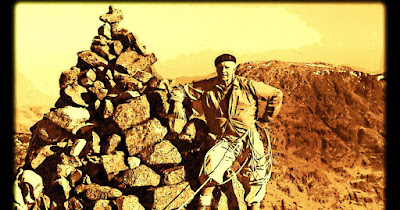
Rusty Westmorland standing next to the eponymous Cairn on Great Gable. Image supplied by Frank Grant
Already his remarkable fitness is becoming legendary. That and his gallant penchant for the company of young lady climbers and his affection for steep rocks remains unabated. " The weather doesn't bother me," he told me the other day, " and I don't mind steep, exposed stuff on tiny holds. But I don't like too many of these arm pulls. Overhangs seem to be harder these days."
AH Griffin: First Published in Cumbria Life-February 1960

“I suppose’ Dave remarked rather scathingly, ‘that this must rate as your best ever con?’ ‘Not bad at all’ I allowed as we-that is the six who had been successfully conned and I-squelched and dripped our way down the steep slopes from the summit of Whin Rigg towards the road,parked cars and the happiness that is a dry bum and socks. This was by far the kindest of many remarks emanating from the large and jolly party regarding the preceding five and a half hours. But then, I had received my training from the grand master of the Con and I’m sure Jim would have endorsed my wholly underhand tactics when the result was such a magnificently traditional days climbing.
Perhaps at this point I should set the scene for readers who have not already turned over to read of greater things muttering, "Oh no, not another of Sainsbury's dismal failures." Picture then- if it doesn't distress too much- the Wasdale campsite at 8 a.m. on a Sunday morning with sufficient low cloud and cold wind to suggest an intelligent retreat to a warm pit followed by a protracted breakfast and an even more intelligent stroll to the welcoming cash register in the bar at Wasdale Head. I stuck my head through the tent flap on just such a morning, dragged on some clothing and headed rapidly in the direction of that central haven for those who have slept on an overlarge ale intake. Already stoves were roaring and health and fresh air fanatics marched briskly about in neat regulation shorts, long woolly socks and Aran sweaters, contrasting with my own regulation Spanish fell boots (no laces), no socks, tattered breeches and aged Helly.
Returning to the tent to find that Jean was still asleep and consequently no brew, I searched for some other member of our group from whom I could scrounge a ready made pot of the life giving liquid. Failing, I resigned myself to separating the stove and some clean pans from the previous night's greasy plates and pots. The next hour- passed in an orgy of tea, biscuits and greasy bacon buttys during which time others of our party emerged and the health and beauty fans strode off into the drizzle. It was during my third brew that I was idly flicking through the guidebook when my eyes lit upon the perfect route and the plot was hatched. It had not escaped my notice that as usual when inclement conditions prevail nobody seemed to have a clear idea of where to go. "I've got just the route for today," I enthused as Bill appeared.
"Traditional stuff, a real mountain day." "Sorry mate, I promised to walk with Heather. today." A pause then, "What is it?" Did I detect a weakening of resolve? "Think about it mate while I see if anyone else is interested. 600 feet and perfect for this weather." Using the same approach elsewhere worked well and in less time than I expected I had gathered five more suckers and when Bill finally cracked the seven of us made a remarkably swift departure in the direction of the lower end of Wasdale and The Screes. Reaching the river bank opposite the water intake building, we rejected the idea of swimming in favour of a rickety traverse across the front of the boathouse. Each hoping that someone would slip into three feet of icy water. Encouraged by shouts of ‘Fall off you Bum!'
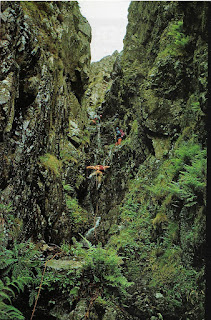
We eventually arrived at the foot of Great Gully to find the initial pitch consisted of a waterfall or greasy moss covered rock as alternatives. "Whose bloody daft idea was this?" someone demanded. "Looks damned unpleasant," said another voice. "Hope you're leading since you suggested it," Dave stated flatly, looking in my direction. Now this had not been part of the plot. I had rather hoped that the rush of enthusiasm would result in someone being so eager to get on with it that I could use the "Yes, I would have liked the honour but don't mind stepping aside," ploy. Such a noble gesture should make it possible to remain in the middle throughout the route. Urged on by the hostile atmosphere I hastily got to grips with the pitch and was at once forced to use a foothold in the main flow of water which instantly filled my boot and came through my "waterproof' trousers. Ten feet or so and I thankfully placed a runner before making an upward lunge for easy ground.
The next vertical section, down which coursed the inevitable water, proved even trickier and since the best finishing hold was in the centre of the stream, naturally it took the shortest route via the inside of my sleeve and breeches to join that already in my boot. Reaching easy ground I walked up the Gully and found a belay, satisfied in the knowledge that removal of my runners would cause similar discomfort to whoever was to follow. The guidebook describes this first 100 feet of Great Gully as a scramble so one could be excused for wondering what to expect on the next 60 feet where climbing was actually mentioned. A considerable amount of time and unprintable remarks, some reflecting upon my ancestry, passed before we were all assembled and ready to continue. Bill gave in with surprising speed to my suggestion that he should take over and made short work of a nasty wet corner before disappearing from my view when the Singer, from his position kept me informed of his progress up a short steep section and along a traverse to rejoin the Gully above a waterfall.
Meantime, Dave went past with another rope and a fair degree of knitting began to develop. By the time I had completed this pitch, helped by a useful sideways pull on the rope as I jumped the last few feet of the traverse, the party was strung out over some 200 feet, what with Bill having continued and Niel and Gerry lagging a pitch behind. The following waterslide proved to be just that and although rated as a single 135 foot pitch, we split it into convenient sections as dictated by fear, exhaustion or degree of discomfort that its ascent brought about. All sense of order had vanished by now and I found myself sometimes leading, sometimes following and occasionally not apparently tied to anyone as we swapped rope ends around. In this way we all assembled in the grassy amphitheatre about halfway up the Gully, all except Bill, not a little wet.
In view of his condition he was unanimously elected to lead on. Up to the left for twenty feet, traverse back right twenty feet and he hit difficulties. Vertical grass, no runners and earthy holds - where they existed at all. We began chuckling. "Its not bloody funny," he yelled angrily. "In fact its bloody serious." This was followed by a stream of Yankee invective from our American cousin. Nevertheless he a struggled on and disappeared from view, soon to be followed by the rest. I did see his point though — it was bloody serious if you happened to be leading, since the key move involved swinging down into the gully bed from two holes in the grass on to a foothold near the lip of a twenty foot drop to a very nasty landing.
After this things eased off and a lot of scrambling, a widening of the sky suggested that the end may be in sight. Oh, and how we were mistaken! Once again a narrowing of the sky as the walls closed in to 3 foot wide verticality blocked by a huge d chock stone twenty watery feet up, with a great volume of fluid coursing over it. By the time I arrived Bill and the Bat had already vanished over this, a fact made evident by their rope passing through a heavy tape just level with the lip of the fall. "The Bat led it," Niel remarked as I viewed the greasy verticality with mounting alarm, "and Bill still appears to be dry."
We swapped ropes round yet again and I struggled up a series of nasty bridging moves with all the grace of a dancing Dervish, until I could grab the tape and pull myself through the main flow and stand above the chock. How Gerry, who stands four foot nothing in platform heels would manage I couldn't imagine. In fact she put us all to shame with a swift and polished performance that did not involve the use of the tape. There must be a lesson to learn there somewhere! Just as I began to think it was all finished we arrived by yet more scrambling, at the foot of what turned out to be the final pitch. A series of loose wet steps led up for 30 feet or so to a vertical ten feet sporting the now familiar waterfall. A nearly new peg adorned the right wall about halfway up the steepest section. Bill and the Bat had already ascended and the Singer was on his way.
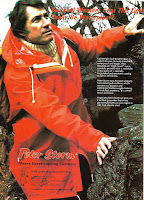
I watched, wet, cold and wondering why I was there when I could have been warm dry and drinking. My turn. Up the steps, the rock pushing me to the left when I wanted to go right, an awkward side hold, foot out to the right wall and lunge for the peg. Useless, it was in the wrong position. A couple of dicey bridging moves and a grab for a hold on the right wall, left hand scrambling over the top, a desperate pull, knees on the edge and I crawled to safety to the clicking of Gerry' s camera. Why do these photographic enthusiasts always record the worst performances? Ten minutes later we stripped off our wet gear in the sunshine that had broken through unnoticed in the dank depths of the Gully. Was it worth it? Undoubtedly I would say, though from the dark mutterings around me dissent upon this point could be sensed. As Pete, the Singer, remarked over a pint much later....... "interesting!"
Tony Sainsbury : First Published in Climber and Rambler-June 1981 as 'In the Finest Tradition'.
Images..Gerry Goldsmith
Opening Scene: Cima Tosi 10,410ft - highest point in the Brenta Group in Northern Italy.
The Players: Six RAF training instructors [1 officer-newest member, this being his first time as an instructor; 4 NCO’s-all established instructors as well as experienced climbers and all-round mountaineers.
Disposition: Knackered, tired, cold and weary after gruelling three-week training course with 16 NATO pilots.
Salvation: Improved weather, ten-day break before the start of next training course, and we all wanted to go climbing, so drove south and camped at Pietramurta.
Following morning, Group leader - Flt. Sergeant ‘Dicky’ Davidson, paired us up, adopting service protocol, of naming the lead climber second. So, when he said: “Robin [the Flying Officer], you climb with Frank”, I knew my place, but as it turned out a few minutes later, my climbing partner did not.
As we walked to the next cliff, he quickly informed me that as he was the Officer and I was not, it was inappropriate for him to be led by me.
Things did not improve when we got to the foot of the cliff and I started to unpack my climbing gear: one old rigid hawser lay rope sling I had acquired earlier, along with my plain white nylon rope which had coloured tape at both ends, and a couple of homemade nylon slings sporting large aircraft nuts with the inside screws ground down, which I (we), used for protection and belays when climbing. They may not have been good looking, but they were effective and they were cheap!
Clearly, he was far from happy with my equipment, and insisted we use his brand-new gear he had recently purchased. But I am a traditionalist and like to stick to my own gear that I know has been tried and tested, so declined his offer which did not go down well at all.
As I was still getting myself kitted up, he tied on to one end of the rope, threw me the other end and told me to tie in when I was ready. Before I could take the cigarette out of my mouth to speak, he moved over to the rock face and started to climb. I stood there in amazement.
Suggestions that he wait until I was tied in and could belay him safely, earned a mumbled reply about not waiting for idiots and ‘time and tide wait for no man’ as he climbed.
My initial thought – yank the rope before he gets too high; untie and walk away; or tie off the rope so he could not move upwards. I chose the last option in addition to lighting up a smoke.
He stopped climbing – started to yell orders – I ignored him – he threatened to charge me – I ignored him – he climbed back down.
Once he was back down on the ground, he started to berate me for my “disgraceful climbing ethics”, and my total lack of respect for his rank.
I took a final puff on my smoke and said with quiet confidence: “When we climb, we are climbers and nothing more and rank does not have a part to play in this activity or any other activity connected with my role as a survival instructor”, which went down like the proverbial lead balloon.
Anyway, an hour later, I had led the first two pitches, (because he said his arms were tired after having to down-climb). We were standing at the belay below the third pitch, when I pointed out to Robin, that I believed this to be the crux pitch: it was long, looked devoid of good hand holds and appeared to offer few places to put in any protection.
As I munched on my first Mars bar of the day, he muttered continuously about me being disrespectful towards him, and that he would be putting me on a charge when we got back to RAF Brüggen. I of course, was busy working out what to do with him for the next few days as unbeknown to him, I was given the task of planning the next few days’ programme!
I asked him if he felt confident doing this third pitch, which may well be the crux, and all I heard was mumbling about him being a good climber and an ex-member of the Oxford University Mountaineering Club.
I made sure he had all the gear he needed: all six ground-out aircraft bolts, some on slings and others on pieces of nylon cord, and my one and only chock on a piece of nylon, and three metal pegs (one flat one being home-made), then I settled back to belay him, ignoring the fact that he started off in a hurry, leaving my peg-hammer behind, because he said it was too heavy and cumbersome.
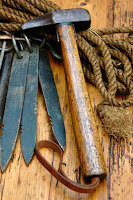
Up he went into a thin crack – not a bad job I thought, a little unconventional with his techniques but he did it. When the crack ran out, he was faced with a hundred or so feet of good clean rock, which he again appeared to master, so I thought that perhaps he may not be a bad climber after all.
Eventually, he made it to the base of a scoop where he had no choice but to belay as he was running out of rope.
Once in the scoop, he secured himself to the rock face and shouted: “ok Grant, climb when you're’ ready”. Now it wasn’t his condescending voice that irked me, but the fact that he called me by my surname, something I had never witnessed before on any of the climbing I had done with other RAF personnel, no matter their rank.
I made easy work of the slab and was into the scoop before he could take in all the climbing rope. I stuck a nut into a small crack and belayed myself to it. He demanded to know why I did not clip myself into his belay point, and was unhappy when I said, that I preferred to place my own protection when climbing with someone who I had never climbed with before, and that it was no slight to his own belay technique.
I, of course, ignored his mutterings but reacted immediately when he started to unclip himself. “Hey”, I shouted, “what do you think your’ doing”. His reply notched up my desire for wanting to put him in his place quickly, when he immediately replied, “you mean, what do you think you are doing, Sir”.
I informed him that it was practice for climbers to climb through, so before I gave him the chance of replying, I clipped him back into the belay loop, stood up and gave him the rope leading into my harness for him to belay me. He complied reluctantly.
I set off up and out of the scoop, thrutching my way until I could get hold of a good jug at the top end of the scoop. It was clear that the rock face above, overhung by about ten to fifteen feet some thirty feet above. What was unclear, was what was above this and where, if any, my next belay point would be.
The overhang looked worse than it was. When I got to the start of the first bulge, it required a leap of faith to go for one hand hold, in the hope that there would be another above that for the other hand, which thankfully, there was.
After setting up a good ‘Y’ belay, I shouted for Robin to come on up.
Silence permeated the air. I shouted again. The silence had not gone away. What was wrong with this idiot! His banality was trying my patience when it occurred to me that he was waiting for me to say: “climb when you are ready Robin, Sir”.
He struggled over the bulge shouting repeatedly for a tight rope which I obliged, making sure that when he wanted me to give him some slack to gain his balance once over the lip, his words fell on deaf ears. When he came up to me, I tied him securely into the anchor point in silence and started to get the rope ready to belay him up the next pitch which was a hundred-foot run out across some slabs, entailing a traverse along a horizontal crack, some ten to fifteen feet above our stance.
Clearly, the traverse would provide ample protection but the initial climb above to gain the traverse did not look as obliging. Robin set off up the wall above our stance to gain access to the start of the traverse. As he did so, he shouted back down: “I want a tight rope here Grant but when I get to the traverse, I want you to give me plenty of slack as I will get across it quickly as this is my climbing forte, so pay attention”.
As he set off, I said nothing about the fact that he did not have enough gear to complete the whole route especially the traverse.
I waited until he had climbed with difficulty, some ten to fifteen feet above me to gain access to the traverse, when this fact became very clear to himself. He shouted back down as to what he should do. I suggested either he climb on with little protection and as he felt this was ‘his forte’ he shouldn’t have much difficulty in doing this, or he climb back down to get some of my gear.
He climbed back down grudgingly. He then said his arms were aching and so he ordered me to do it! I was not amused in the slightest.
After a while, he was standing beside me and very unhappy with the next pitch and informed me that he decided I would climb this also. I was happy to do so. Before I had made my mind up whether to go up the face on what appeared to be small infrequent holds, or to reverse a few feet along the traverse and try to go through the small roofs above, Robin threw another remark in my direction: “the route goes up there Grant, but if your’ not up to it, I will have to lead it”. That was it, I had had enough. This was a good a time as any to teach him the meaning of humility.
“Right, up you go then”, was my reply as I tied myself back into the anchor point. After some ten-minutes, he was still struggling to get off the belay position, muttering about the rock being too wet!
Eventually, he got started and was eager to get in his first piece of protection, then a few feet more and another piece of protection. Sweating and panting some ten feet above the belay stance, he put in his third runner and then asked for a tight rope as he needed to take a rest, as his arms were pumped.
I obliged, but offered him no encouragement at all. “Can you see where to go next” he enquired with a quiver in his voice. I remained silent. Some expletives were made from above as he tried to make upwards movement but as he hadn’t asked me to take him off a tight rope, he just fell off. He would, of course, have landed not far above where I was standing at the belay stance, if his protection was in properly, which it wasn’t. Out came the last one he had placed and down he dropped. Out came his second-last and down he dropped even further, and then out popped his first runner just above my head and down he fell again. Fortunately, it was where the cliff face was leaning out so he hung there oscillating unceremoniously some fifteen feet below me.
My tight belay held as I knew it would. He dangled there on the end of the rope over a drop which looked and probably was, just as frightening, especially to him. I tied off the rope so that it would not slip any further and got out a Mars bar and started to eat it slowly.
His demands to be pulled up, fell on deaf ears just as his orders to lower him down to a ledge, twenty-feet below him which would have eased his discomfort. But deaf ears and a Mars bar won the day.
When I had placed the last piece into my mouth, I looked down and suggested he start to climb back up to the belay stance. “But I can’t” came his desperately shaking voice. “Pull me up to the belay”, came his next command, his voice softening a little. Now was the time to be vindictive. What, you thought I had already been so, you must be joking!
Swallowing the last piece, I looked over the edge and said in a condescending voice, “Robin, don’t you mean, please Frank, pull me up to the belay”
“Yes please, Frank” came his quaking voice. Setting up a small pulley system with a back-up system in place, I started to pull on the rope which instantly drew a thousand thanks from a shaking young man, but just when he thought he was going to make the belay stance, I slid off the half hitch I had put in to the pulley system and he fell right back down to where he was a minute before.
The yell could be heard echoing across the Alps and the sight of him clutching frantically at the rock face was food enough to feed my vindictive soul. “Sorry pal” I shouted down, “the rope slipped, I’ll try again”.
When he finally sat, puffing and panting on the belay stance shaking with fear with the odd bit of moisture in his eyes, I gave him my party piece. “Robin, do you want to climb with me or climb with a non-commissioned officer?”
His remark was sweet music to my ears. “I’d like to climb with you Frank and I would appreciate it very much if you could lead the rest of the climb”.
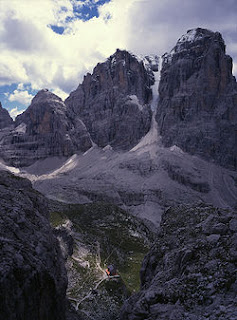
Robin left the survival training group a few weeks later, and whenever we met around the camp, whilst I would accord him the respect his commission deserved by a salute and addressing him as Sir, he always addressed me as Frank. Who says that having just a little vengeful streak does not have its rewards!
Frank Grant © 2017

So Cenn has gone. Cruelly cut down in his mid 60‘s by a bastard degenerative neurological condition. Was it Motor-Neurone Disease....I don’t know? Whatever it was, it left him a prisoner. Trapped inside a fragile,creaking cage. Immobile and eventually wasted to the point of mumbling muteness. But what do I know? I hadn’t seen Cenn for years and can only relate what my children have told me. Despite knowing Cenn since my late teens, life events had shaped our relationship over the passed twenty years. The withdrawal from my life of Cenn’s best friend ‘Angiebell’, had meant our meetings were all too infrequent and limited to family events...Births, weddings and deaths, but time was, when he was an ever present fixture in my life.
I first met Ken- as he was then- in Liverpool in the early 70‘s. He was a wild haired, bearded freak- think Ian Anderson and Jethro Tull circa 1972. Fiercely intelligent, opinionated and principled, and like myself, he was tired of city life and together we planned our escape to the promised land of North Wales. By the mid 70‘s Ken had become Cenn and had left the city behind. I would follow two years later after a brief stop-over in Chester. During this period he was travelling extensively in north Africa. Living with aid and charity workers in Niger, Bukina Faso and Mali, and amongst the indigenous people of those desperately poor states. After his brother had tragically died of an epiletic seizure while Cenn was staying in our flat, he gave his entire share of his brother’s estate to Oxfam and Plaid Cymru. Hence his life long commitment to the charity and his voluntary work with them in Africa in the mid 70‘s .
In the early 80‘s. Cenn joined me as a leader/instructor with a North Wales charity group- The Clwyd Outward Group- which took socially disadvantaged youngsters, mainly from urban conurbations like Wrexham, on outdoor activity weekends. For many of these youngsters it would be their first visit to a mountain environment and certainly, their first opportunity to participate in a range of outdoor activities....climbing/abseiling, kayaking, sailing and hillwalking As to be expected, Cenn was a good natured and tolerant figure who related well to our charges.Surprisingly so considering some of the more ‘challenging’ youngsters we had under our wing!
Cenn never married, had a long term relationship or much of a relationship of any description come to that. He remained the eternal bachelor and gave his affection to close friends, my children, cats and dogs! He never learnt to drive but that didn’t stop him travelling. An oddball, eccentric, square peg in a round hole. Someone who would argue black was white and was usually right...it was! A bookish,vegetarian,leftist,nationalist who loved mountains,animals and cheese!......Cenn's gone but as his fellow Scouse poet Brian Patten writes...'
'A man lives for as long as we carry him inside us,
for as long as we carry the harvest of his dreams,
for as long as we ourselves live,
holding memories in common, a man lives.'
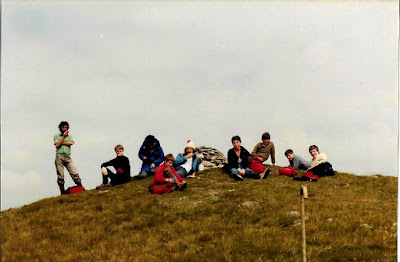
Cenn on the left with a COG party on the summit of Pen Llithrig y Wrach.
Now here’s the weird bit. The idea for this article literally came to me in a dream last night. In my dream I was in the attic looking to see if I could find those wonderful evocative letters that Cenn would send back from Niger and Mali. Colourful, poetic and charming. At first light, I hauled out a step-ladder and pulled myself up through the hatch and began rooting around in boxes amongst the cobwebs and mouse droppings. Just one letter came to hand and it is this letter which I reproduce here, Just as it was written nearly 40 years ago. In another strange twist. As I sifted through old theatre programmes, notebooks and assorted bits of paper deemed of sufficient sentimental value to keep, a poem that Cenn had written for my late son Jamie when he was born in 1978, fell out of a note. Cenn has specified that he wants to be buried in the same cemetery as Jamie...and so I understand, it shall be.
Cenn was a Welsh language learner so if the first paragraph- which is written in Welsh- does not quite read correctly to the native speaker, please accept it in the spirit it was written, from someone who loved Wales to his very core. JA
"Niamey,24 Mei
Annwyl Sion,
Annwyl Theatr Clwyd ac ur annwyl Wyddgrug! Annwyl Iaith ac annwyl Gymdeithas yr Iaith! Annwyl Halcun! Annwyl Jack Nicholson!
Yr eiddoch yn gywir,
Cenn
PS. Dioloch yn fawr i awn am y cerdyn
Annwyl Angiebell,
Sala’am aleik. El kheir ras. As you doubtless know by now, I received your letter, a breath of quasi-Celtic Cestrian air in the heavy Sahelian heat. And today at post restante, a patriotic post card from Sion ap Pleby!
Oh to hear Blood on the Tracks or Desire or Hissing of the Summer Lawns or New Skin for the Old Ceremony or......but things are not so bad. Mark Nieuwark has cassettes of Dylan, Fairport, Beatles, Floyd, Neil Young, James Taylor and a good selection of classical music; and at his house a couple of days ago I found a dog eared ( sorry Fred) copy of Zen and the art of motor cycle maintenance which I hope to beg, steal or borrow before long!
Last weekend, with two companions, one Antipodean and one American, I discovered a cafe which serves big bowls of iced yogurt with crisp buttered bread, for 75 francs CFA, about 15p. That Sunday, my first day’s eating after a two day fast against dysentery, I scoffed a double helping, and ever since have been eating yogurt twice daily, amongst other things. One of the latter is delicious black eye beans and rice,which we buy on the street, all you can eat at 25 francs a time.
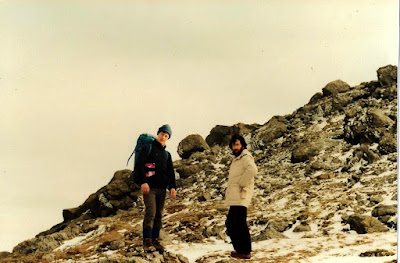
Hugh and Cenn on Aran Benllyn
We? Don Ada, Australian, arrived 13th from Agadez and Algeria,left 18th for Ouagadougou en route for Tanzania; Dave Walters, American, arrived 14th from Ouagadougou and Ghana, left 17th for Zinder, en route to Cameroon; Roland Witschi, Swiss, arrived 17th from Agadez and Algeria,left 19th for Ouagadouga, en route to Bamako; Pete Remington, English,arrived 22nd from Zinder and North East Nigeria,still around as I write but en route for Agadez, Algeria and home.
I’m doing more reading than anything else except perhaps sweating. I brought Day of the Jackal with me from Gao, where an English fellow-traveller gave it to me. In Hamani’s box of books I’ve found and read Orwell’s Down and Out in Paris and London; Graham Greene’s The Power and the Glory; Midpoint, a book of poems by John Updike; and James Baldwin’s Go Tell it on the Mountain.The Orwell and Updike were interesting, the Greene and Baldwin were both very good indeed. Any other lists I could bore you with?
My last trip to Oullam with the man from Caritas, originally scheduled for last Sunday or Monday, was postponed, perhaps indefinitely; I’ve been hanging around all week waiting to hear from them. Mark, who as Oxfam’s representative here has formal and informal contacts in Mali for the last few days,so communication has been a little difficult,but he came back today,so I should know quite soon whether I’m staying or going and whichever, where.
Doggerel jotted in in-flight movie machine between Paris and Dakar on the 10th April:
Oh Africa, I’m coming home from home
To spend a half year homeless, and to roam
In one vast corner of you, there to seek
What makes my vision strong..my body weak
This evening I went round to Mark’s house and found him preparing to show home movies to a small audience: two Americans and two English people I’d met already, Tessa and Chris. The movies or rather slides, were of Bororo nomads ( a people I love) at Gao in Mali, where I spent a couple of days at the beginning of this month sweltering amongst familiar ghosts (a place I love), and these particular Bororo were from Abala, where I spent a couple of days quite recently communing with unfamiliar ghosts (love). Tell me these loves were not my coffin nails.
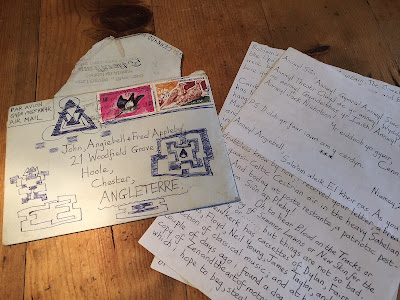
We ate peanuts, and drank rum and lemon, and talked, and watched slides, then went our separate ways,though not before I had put myself in the queue for a certain book on motorcycle maintenance, which turns out to belong to Gary, who works for an American relief agency. Mark and I and an American girl whose name I’ve forgotten, went to a Vietnamese restaurant, delicious but expensive,then Mark took me, brought me, back to Hamani’s.
Soon, before the rains, I’ll go to Agadez. then perhaps back to Abala. Sometime to Ouallam. Work, or wander. To Ouagadougou, or Cameroon, and back to Niger again. I’m leading a slow, soft life. Past pounces, present purrs, future fawns. Roads stretch from here to everywhere. Happier still hearing you’re all happy.
Love Cenn
Niamey, 25 Journada I.'
Cennydd Williams: 1978
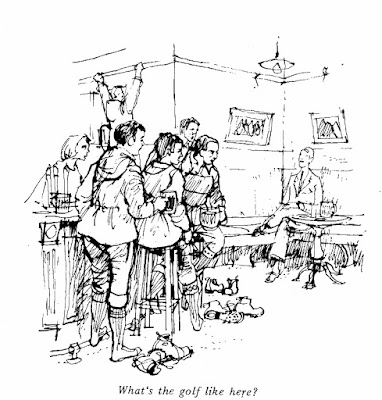
Here is another of those excellent short stories by Kevin FitzGerald, which while continuing his theme that ours is a ludicrous sport, hints that it might perhaps be something rather more.
Twenty five years ago there were some minor differences in what I believe is called 'the climbing scene' from what you would find in the North Wales of today. For example all the inns and hotels, all the eating places had a notice outside the public rooms, 'No nailed boots beyond this point, please', and there were various regulations, now deemed absurd, like putting on some kind of jacket if you were having a meal. But the men and women and the talk were all much the same, with one major difference. There was an immense amount of evening- indeed practically all night, activity. Everyone, but everyone, indulged in some eccentric display of skill or feat of strength. Groups took off at midnight to run round the Snowdon Horseshoe by moonlight; rooms were traversed, and chairs climbed round; loops of rope were climbed through, and wrist grips exchanged; heads were balanced on, and impossible steps were made across unbridgeable fireplaces.
Dead bodies were simulated and lifted, knots were practised, and peculiar athletic challenges were issued and at once accepted. People raced each other over the Glyders in the dark, or found out who could run from Pen-y-Gwryd to Pen-y-Pass and back in the fastest time. Much later, in the early sixties, the Editor of this Journal* was unbeatable at that particular exercise. There were not so many of us, of course. That was the real secret. We all knew each other, were glad to be meeting each other again and always felt in the mood for nonsense. I remember one such week-end of activity with peculiar intensity, largely I think because it created more confused disturbance in a limited space than I would have believed possible, and because it produced a brand new climber of all round excellence from the unlikeliest piece of material, other than myself, I have ever encountered in the mountain world. It all took place at PyG and it centred on a bag of golf clubs.
It was early winter, and half a dozen of us had been walking over Carnedd Llewelyn, enjoying on the return journey a marvellous snow glissade nearly half a mile in length. We were all in high spirits, kicked off our boots in the bar and sat round in stockings waiting our turn for a hot bath and talking the same nonsense you would hear today. There was a little man in a corner who sat watching us and saying nothing. He was wearing (I can see it still) a rather nice suit of dark grey with beautifully polished brown shoes and he had what I think is still called a 'crisp' military moustache. We were all in breeches and anoraks, one or two of us wearing the red stockings now somewhat out of fashion but then signalling that the wearer had made a first ascent of some importance. The little man must have thought that he had wandered into the clowns changing room in a circus. All of a sudden he spoke. 'What's the golf like round here?' he asked.
In those days he might just as well have asked if anyone had a boa constrictor they were not using, and he produced what is still called I think 'a stunned silence'. No such question can ever have been asked before in that place although I have since heard people there talking about fishing, the archaeological interests of the neighbourhood, and whether anyone would care to make up a four at bridge. But in those days if you were not climbing or walking, or preparing to do either, or keeping fit for both, you had no business in that part of the world at all. We all looked at the little man in silence. Then someone said, 'I've heard that there is a golf course at Harlech and I've been told there's something of the sort down in Bangor'. 'No,' the little man said, 'I mean round here. I'm told there's a lot of good golf round here.
Two of my friends are arriving in Capel tomorrow and they've told me to be sure and bring my clubs'. Even in those far off days, five years before Everest, I was pretty old to be in that company at all and I thought perhaps I ought to speak first. I remember so well that as I replied one of our future 'greats' was working his way round the specially strengthened picture rail in the old fashioned bar of those days. He had just passed the cash register and, in accordance with strict custom, had rung up `No Sale' with his stockinged right foot big toe.
You had to do that or your traverse didn't count. 'There's no golf immediately round here,' I began in my fatherly way, 'this is a climbing inn and everyone who stays here, or comes in for a meal or a drink, either climbs or walks.' `I think you are mistaken,' the little man said, 'my friends are very reliable.' We left it at that and I recall that after dinner we all tried climbing round a chair brought in from the kitchen. The little man watched these antics for a bit and then got up to go to bed. 'This place seems like a mad house to me,' he said, quite mildly, as he left the bar. We instantly forgot about him. The following day we all went off to Tremadoc, those admirable 'wet day on Snowdon' cliffs discovered by Dave Thomas flying over them during the War.
We got back late, just after the early winter dark, and the little man was sitting in the bar alone. He was a terrifying sight, white as a sheet, filthy dirty, his hands all scratched, a pair of flannel trousers ripped to pieces about his knees. He looked as though he had been run over and, indeed, I thought that was what had happened to him. I asked him if he was all right. 'I think so,' he said, 'but you were quite right yesterday —there is no golf round here. They took me climbing.'
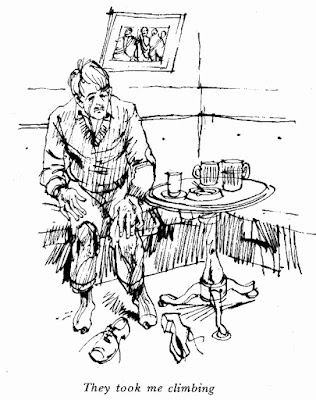
I addressed him with great seriousness, and with all the earnestness I could get into my voice. 'Get away from here,' I said. 'One more experience, just one, and you will never escape from these people for the rest of your life. You will never escape from places like this, or worse. You will always be wet, cold, and in misery. All your friends will be ghastly fit men running up and down mountains for what they call fun. In all probability your wife, if you have one, will divorce you within the next couple of years; you will get fond of obscenities like tents and packed lunches, you will take great rucksacks with you wherever you go and they will be filled with rotting meat and Kendal Mint Cake, if you know what that is. Naturally, arriving like that, you will be refused admittance at all civilised lodging or eating houses throughout the world. You will have to know about map reading and the setting of compasses.' I almost went down on my knees to this little torn-to-pieces man. 'Go out into freedom,' I implored him, 'go out into safety and comfort, go back to a loving wife'. I took a deep breath and uttered blasphemy for his battered sake, 'Go back to some bloody golf course,' I cried, almost shouting, 'and be happy'.
Not tonight,' he said, 'I'm too tired, too much hurt.' We all went into dinner. That night there was 'traversing' in the bar. Several people had got round and I, as usual, had fallen off, only, that time, hurting an ankle a little bit. Everyone was pretty happy.
Suddenly there was a disturbance; the little man had begun shouting. 'Damn and blast you all,' he cried, 'every last one of you'. He kicked off a slipper. 'And damn and blast this place and every place like it in the whole wide world.' He stood up in his socks and flung himself at the picture rail, muttering curses all the way round, but never touching the floor. He arrived at the cash register and I expected to see him lash out at it. Instead, with a most dreadful and sinister smile, he looked down over his feet and, with an infinity of care, rang up 'No Sale' with his right foot big toe.
He completed the traverse and sat down by his slippers. 'So much for all that blankety stuff,' he said, 'And so much for all of you. Good-bye'. He limped out of the bar. But it's nice to be right sometimes. It's not five months since I last saw that chap, and I see him pretty often as the years go by. He belongs to most of the recognised climbing clubs and organizations. I always say the same thing when we meet, and I said it then. 'How's the golf going,' I asked him, 'Not too good,' he replied as he always does, a man who hasn't touched a club for a quarter of a century, 'but I tell you what, Kevin.
That climb on El Capitan they call The Fairway is tremendous. It's miles above my standard now but at least I've seen it, and been on the first pitch and a bit of the second. Talk about hard!' `I don't know about it,' I said, 'but I suppose it's named after one of those big chaps, Nicklaus, Palmer, or Jacklin; one of those'. `Oh them,' he said, stooping to his boots, 'imagine footling around on some golf course when you could be walking about on a hill.' He went off to have a bath. Even his language had improved.
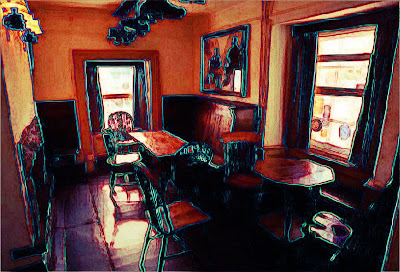
Kevin FitzGerald insists that the whole story is true — The chap DID come to play golf, he DID get taken up East Gully — and I never saw a man so frightened as he was that night. I DID beg him to go away, he DID fall off the boulder and he DID make the traverse round the bar. In later life, he preferred sleeping out of doors in a bag, and two years ago — while we were having lunch in London —he actually said to me 'let's do something bloody silly, like walking from here to Wales.... Now!'
Kevin Fitzgerald: First published as 'Be sure to bring your clubs' in * Mountain Life-April/May 1975



















